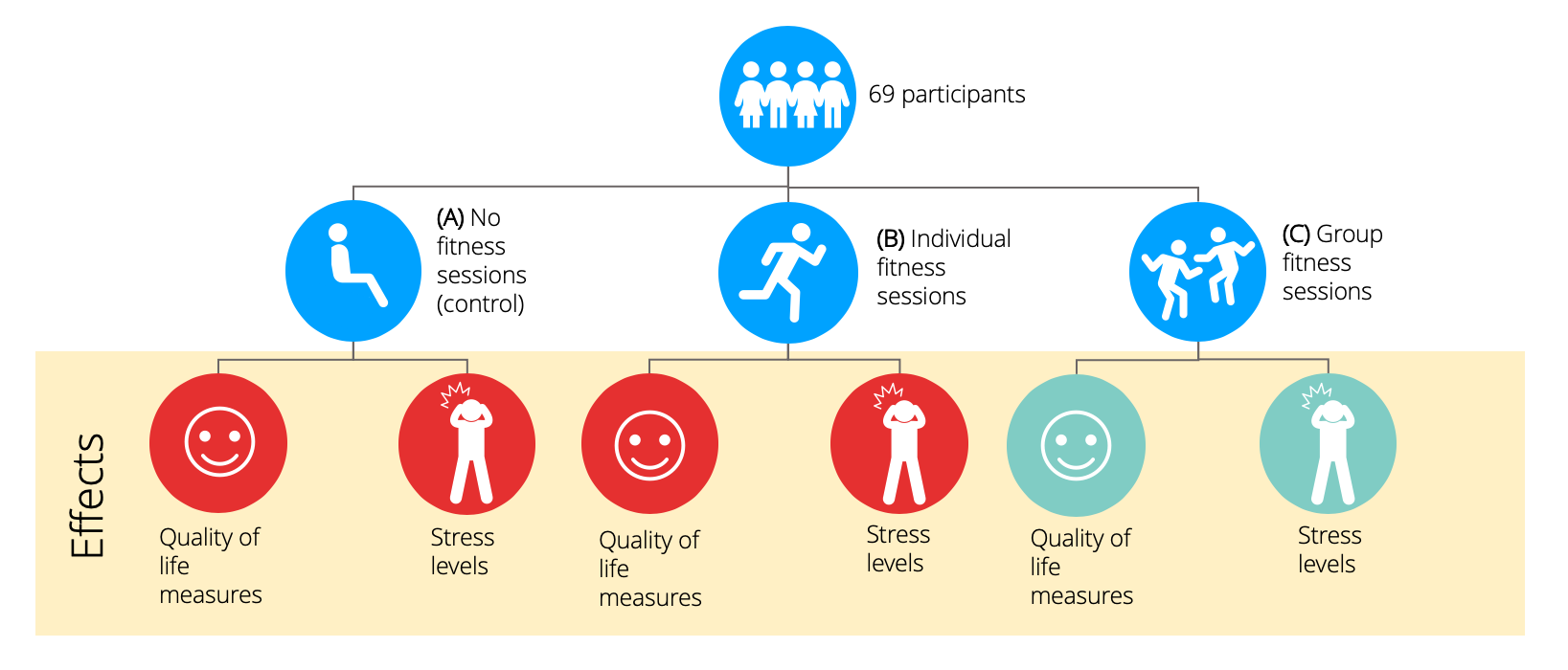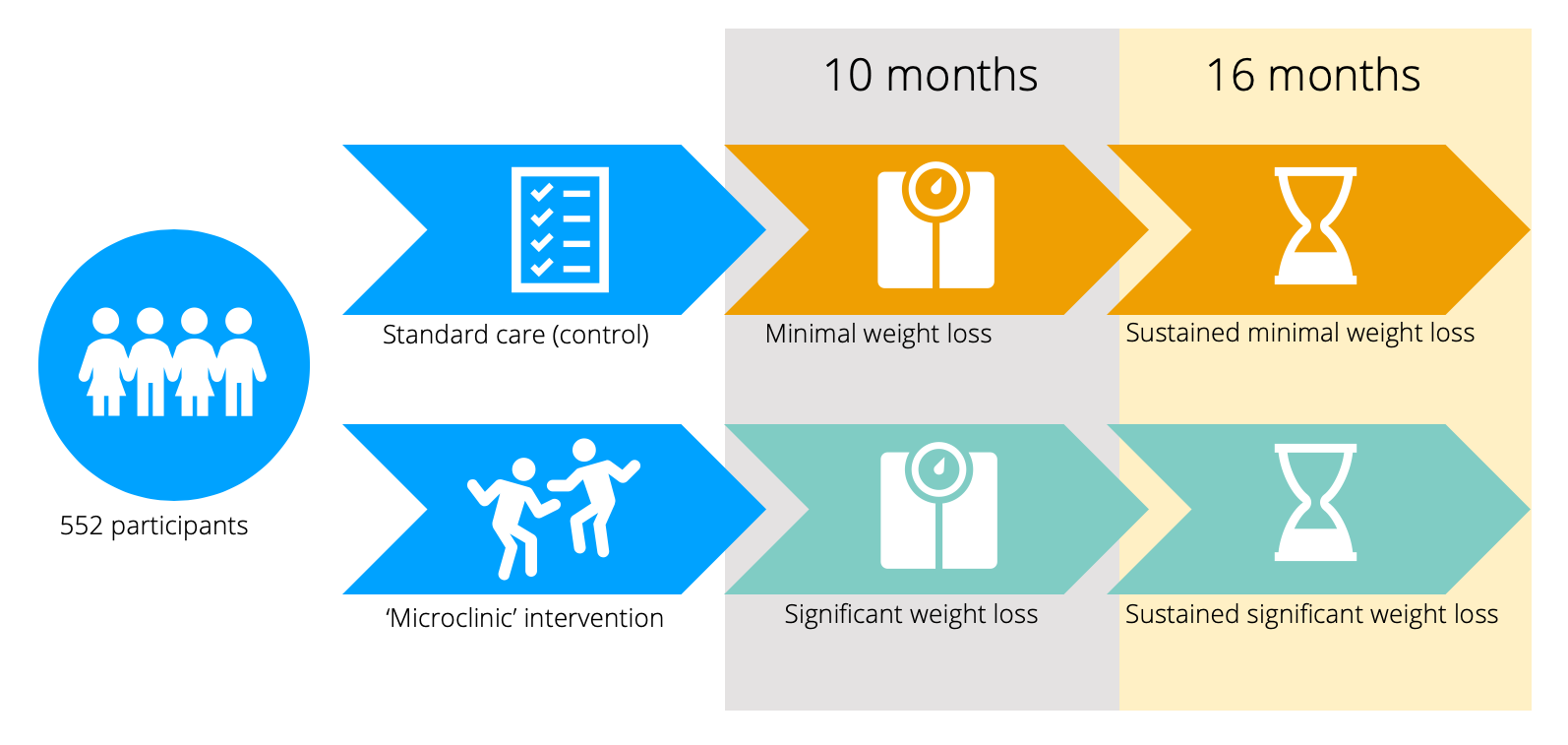Humans are social animals that crave social interaction. It’s no wonder that our social network can strongly influence the success or failure of our lifestyle changes. Aiming for the same goal as one of your friends or family members can be extremely motivating.
Medication-assisted weight loss with a future focus
Start with Mounjaro, transition to habit-based health with our support

Changing your habits
One of the hardest things to do on a health journey is to form new, sustainable, healthy habits. In a TED talk psychiatrist Judson Brewer points out that we build habits based on context-dependent memory. This means that our brain remembers what actions make us feel good and then drives us to repeat these actions in the future.
Forming healthy habits with other people is potentially very enjoyable and motivating, which means it could be more likely that we will continue it in the long-term.
Exercise
Exercising is extremely important for all aspects of health, both mental and physical, but can be a difficult habit to start for some.
A recent study examined the effect of individual and group exercise on self-perceived mental, physical, and emotional health.
Participants in this study were randomised into 1 of 3 groups:
(A) No fitness sessions (control)
(B) Individual fitness sessions
(C) Group fitness sessions
After 12 weeks, average monthly scores for group (C) had significantly improved across all three measures of quality of life (mental, physical and emotional). Group (C) also demonstrated a 26% reduction in self-perceived stress levels at the end of the trial.

Contrastingly, group (B) showed no significant improvements in any of the quality of life measures, apart from mental health, despite exercising for longer on average than group (C). Group (A) showed no significant improvement in any quality of life measures.
These results suggest that exercising with others could improve emotional well-being and stress levels significantly more than exercising alone.
By Judson Brewer’s theory mentioned above, if it makes us feel good, then there is a higher chance of it becoming a habit. So, it seems that exercising with others is a great way to improve mental health while increasing the chances of exercise becoming a habit.
Smoking
For some, quitting smoking is a priority on their health journey but a difficult habit to change.
An extensive systematic review explored the effect of group therapy compared with self-help, and other interventions, on quitting smoking.
From 13 trials comparing a group program with a self-help program, evidence suggests that group programs are more effective in helping individuals quit smoking.
Key points:
- Exercising with others appears to improve your physical, mental, and emotional well-being significantly plus combat stress more than exercising alone.
- Research suggests that group programs are more effective at helping individuals quit smoking than self-help.
Losing weight
Weight loss is a common goal for individuals embarking on a health journey, but there is no quick fix. Losing weight requires commitment, patience, and time.
Many observational studies examine the effect of behaviour change in social networks. However, it’s important to bear in mind that observational studies point towards a relationship between two factors rather than a cause.
One of the first controlled trials explored the concept of ‘microclinics’, where individuals are grouped with friends and family to partake in a weight loss intervention.
We know that unhealthy habits, such as smoking and eating junk food, are socially contagious. These studies looked at whether good behaviours, like exercise and healthy cooking, can be equally as contagious.
552 overweight and obese participants were randomised into either the intervention microclinic or the control standard care weight loss program. The microclinic groups participated together in exercise, nutrition, health education, and social activities, whereas the standard group were provided information on healthy eating and exercise but had to implement these on their own without group support.
Results demonstrated that the intervention group lost significantly more weight at 10 months than the control group. The intervention group also reduced fat tissue in the stomach and reduced waist circumference significantly more than the control group. These decreases in weight and waist circumference were maintained at 16 months (6 months after the trial ended).

The lead researcher of this trial at the Harvard School of Public Health, Eric Ding, highlights that these results support leveraging social networks to encourage healthy habits. Plenty of anecdotal evidence also suggests that people find it easier to build healthy habits with a friend or family member.
Key points:
- A large randomised controlled trial demonstrated that utilising social networks to change lifestyle habits resulted in significantly more weight loss than standard care.
- This weight loss was sustained after 16 months.
Getting your friends and family involved
The trial above highlights the positive impact starting a health journey with friends or family can have. On a daily basis, the behaviours of those around us have a dramatic influence on our own behaviour. A good example of this is how our eating habits are closely related to what those around us are eating.
A randomised trial assigned groups of three friends to a restrictive condition, in which two of the friends were secretly instructed to restrict their intake of appetising foods, or a control condition, in which the friends were not instructed to restrict their eating.
The third friend’s consumption was measured while eating with the other two friends and while eating alone. Participants consumed less food when eating with friends who had been given restricting instructions compared to those who had not been given those instructions, and this continued when they were then eating alone. This tells us that we’re likely to mirror the eating behaviours of those around us. If everyone else is eating more, we will also eat more and vice-versa.
Try to get a friend or family member to start your health journey with you. You could try adding a fun competitive element to kick start the process, such as who can walk the most steps one week. You could even sign up to a lifestyle change program, such as Second Nature, together. Doing so gives you a sense of accountability and can increase your motivation to achieve your goals.
Key points:
- We are heavily influenced by the behaviours of those around us.
- Starting a health journey alongside a friend or family member can increase motivation and help us practise healthy behaviours.
Take home message
- Adjusting habits is essential for long-term healthy lifestyle changes.
- Exercising and quitting smoking are common priorities, both of which seem to be more effective when done alongside others.
- Research suggests that health-related activities are more effective when people take part with friends or family members.
- Social engagement seems to be a more effective tool to achieve health-related goals compared to standard care or financial incentives.
- Engaging friends or family to make health-related changes with, or connecting with a wider social network, seem to be effective ways to build healthy habits.



Social is the best motivation
A randomised trial examined whether social mentorship from a stranger or financial incentive was more effective than standard care in helping individuals with diabetes decrease their blood glucose levels.
118 participants were assigned to 1 of 3 groups:
(A) Standard care (control)
(B) Social mentorship
(C) Financial incentive (up to $200)
Social mentors, who had previously struggled to manage blood glucose levels, phoned participants once a week.
Compared with the control, the financial incentive group (C) did not significantly improve blood glucose levels. However, the social mentorship group (B) significantly reduced blood glucose levels compared with the control.
These results highlight the importance of social engagement to achieve health-related goals, which, in this case, was stronger than a financial incentive. The study also suggests that connecting with a wider support network, outside of friends and family, can increase the chances of achieving health goals.
Joining a weight loss program, finding local meetups, or joining an exercise group are all fantastic ways to get support from a social network outside of your immediate circle.